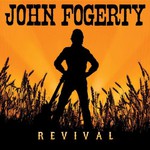Revival
Studio Album by John Fogerty released in 2007Revival review
Free from mortifications
It's not a secret that relations between labels and musicians may be too tense and sometimes lead to real undisguised confrontation. In the case of American folk rock singer and founder of a well-known band Creedence Clearwater Revival John Fogerty this confrontation stretched for 30 long years. The whole story carries a pretty complex and tangled character, it is full of rumors, withholding facts and human emotions so there is no sense in describing them all - the borders of this article won't fit them anyway. But it is necessary to mention that some of its episodes upset Fogerty so much that he decided to give up his musical affairs for 9 years in 1976, not long after release of his second solo album. As a matter of fact, Fogerty's actual solo career started in 1985 when he recorded his third album Centerfield, which is still frequently played on Classic Rock radio but he became free from mortifications and misadventures of his past only in the new century. His new album Revival is the first album on which Fogerty recalls his Creedence Clearwater Revival days with ease.
Journey to the past
However, despite such a significance of this new album for John Fogerty himself you shouldn't expect that Revival is something really different from his former works. Fogerty never betrayed his style even during the bitterest days of his career when he strived to break all ties with his past so why should he do it today when he no longer has any grudges against his ex-bandmates and home label. Revival is a sort of a journey to the past. Unlike many old-timers who have eventually adapted themselves for the standards of modern sound Fogerty imitates old sounding with a pure rapture as if he had no chance to slake this thirst for vintage production before. One of the brightest examples of Fogerty's obsession is represented by the track with such a self-revealing title as Creedence Song. Sharp solo guitar, typical tube overload, old-school rhythm section and extremely recognizable voice of Fogerty with a thick layer of familiar studio effect over it. In fact, Fogerty's voice sounds almost unchangeable and looks as powerful as 20 years ago. Listen to Summer Of Love, for example, and receive an evidence of this astonishing fact. Besides, this is one of the most atypical songs of this album. Here Fogerty departs a little from bluesy standards of classic rock and gives himself up to playing punk variations but as a whole the song was recorded with that exaggerated vintage sound. Such a combination sounds more than just interesting.
The most explosive record of John Fogerty
By the standards of John Fogerty himself Revival is a very expressive and even heavy album. He grows simply furious on I Can't Take It No More, which can't be called nothing but punk rock-n-roll and he manages to step on AC/DC territory on the very last track Longshort. It's not heavy metal of course, everything is done in the borders of blues rock, but relative to his former works this album looks like an explosion at times. Although it still has a sufficient number of Fogerty's trademark themes that are concentrated mostly in the first half of the album. Don't You Wish It Was True, Gunslinger, Broken Down Cowboy are perfect mid-tempo stompers in the vain of his best compositions. As a whole Revival looks very competitive, old fans of John Fogerty will definitely estimate it at its true worth. He managed to reanimate the sound of classic rock without any loss, which makes Revival a truly unique record. Besides, the album as such takes quite a worthy place in Fogerty's entire discography and has all rights to claim to be one of the best solo records of this legendary performer whose songs has become incarnations of the struggle against war in Vietnam.

